A
TREK IN ROMANIA
A
STORY FOR DANI AND LIOR
by Granny Doreen,
August 2006
Before you start perhaps you want to get an atlas
and look
for the country Romania.
When you have found it look for ‘Carpathian
Mountains.’
They are a range of mountains shaped like a bent elbow. 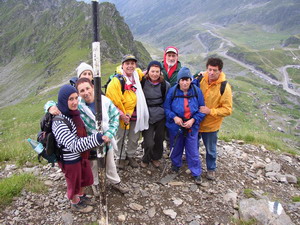
Granny with a
group of
friends spent a week climbing the Carpathian
Mountains,
sometimes in the rain and sometimes in sunshine.
The people of Romania
who live in
villages are
poor. They have a house and a yard with a vegetable patch where they
grow
cabbages and peppers, delicious tomatoes and sometimes corn. We saw
many
farmers riding in a horse and cart. They own a few sheep and perhaps a
cow,
some chickens for eggs, and occasionally a pig.
At the back of the yard they have a barn that has two stories.
During
winter, which is long and cold, the animals live in the bottom of the
barn. Under
the roof, the farmers store dried hay to feed the animals during
winter, when the
ground is frozen over. The dry hay causes the sheep to give very little
milk. When
spring comes and green grass begins to grow, the farmers give their
sheep to professional
shepherds.The shepherds go from house to house, collecting
the sheep and
writing down in a big book how many sheep each farmer hands over to the
shepherd. When they have gathered all the
sheep in the
village, the dogs keep the sheep together and help the shepherds herd
the sheep
high up into the mountains. The bases of the mountains are covered with
forests
with different kinds of trees. As they get higher only fir trees grow.
Higher
up above the fir trees are the alpine meadows where the greenest and
sweetest
grass grows. This grass causes the sheep to give lots of excellent
milk. The shepherds
will stay with the sheep in the alpine meadows throughout the summer,
from May
until October.
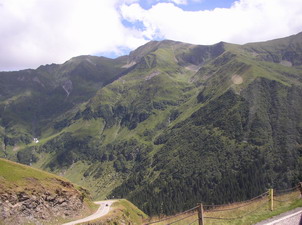
During the day the shepherds take the sheep to
graze in
different parts of the mountain. One day they graze in one area and the
next day
they go to another mountain, so that they won’t finish all the grass in
one
area. The shepherds milk the sheep and
make cheese from it. In the shepherds’ hut that they have built from
logs they make
a fire from chopped wood and in a huge black pot they boil the milk.
They then
put the milk into bags of cheese cloth so that the whey (the thin part
of the
milk) drips out and inside the cloth remain the curds (remember Little
Miss
Muffet?). They mince the curds with a hand mincer, add salt to it and
then form
it into wheels. To some of the cheese they also add garlic, press it
together and
then they wrap the cheese in the bark of fir trees to give it a special
taste.
This cheese is called Borduf. During all this process they write down
how much
milk each sheep gives and how much cheese they make from it so they can
tell
the farmers at the end of summer.
At night they herd all the animals into an area
enclosed by a
wooden fence. The shepherds don’t sleep in the huts but lie down
outside near
the animals. They cover themselves with thick sheepskins and go to
sleep. Now it is the time for the dogs to
be alert and
on guard. In the forests there are many
wolves and bears. In fact there are more bears and wolves in the
forests of Romania
than in all the forests of Europe put
together. The dogs will growl and then bark if
any danger approaches, warning the shepherds to wake up, chase away the
animals
and save the sheep.
Wolves are strong and if they can, they will jump
over the
fence and snatch a sheep and run away with it to feed the rest of the
pack of
wolves, including their cubs.
Poo Bear loves to eat honey. We know that bears also eat the roots of
plants and
berries. But when they feel that the summer will soon end, they will
try to eat sheep which are not only tasty but also
full of
fat. Bears need to get very fat by the end of summer because they are
hibernators. In winter the mountains are covered with deep snow and
there is
nothing for them to eat. When winter
starts the bears will go into a cave and sleep there for months, only
waking up
in spring when the flowers start to
bloom.
So when Granny and her friends were trekking we
went to see one
of the shepherds’ hut in the Piatre Criolla
Mountains. We first walked along a path that ran along a
river with steep mountains on either side. After we rested and
drank water we left the path
and
followed a track into the mountains. It was very steep and muddy and it
was
hard work climbing over the rocks. The path then wound its way through
the fir
trees. Between the trees we saw raspberries and blackberries which we
picked
and they were very tasty.
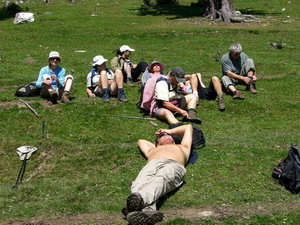
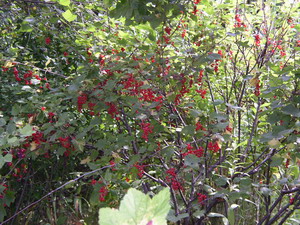
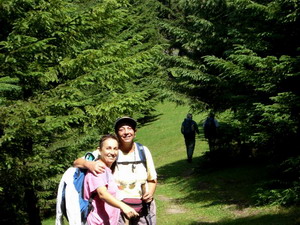 It was very quiet as we walked in the forest.
Sometimes the
trees were so thick it was dark even during the day. We knew that
wolves sleep
during the day so that there was nothing to be afraid of. We also knew
that
perhaps there was a bear who could smell us in
the forest but because we were all walking
together he would not attack us.We climbed higher and higher
and then suddenly
through the
fir trees we saw fresh green grass with lots of wild flowers growing in
it. We
had reached the alpine meadow.
It was very quiet as we walked in the forest.
Sometimes the
trees were so thick it was dark even during the day. We knew that
wolves sleep
during the day so that there was nothing to be afraid of. We also knew
that
perhaps there was a bear who could smell us in
the forest but because we were all walking
together he would not attack us.We climbed higher and higher
and then suddenly
through the
fir trees we saw fresh green grass with lots of wild flowers growing in
it. We
had reached the alpine meadow.
The path turned into a dusty track and while we
waited for
the shepherd’s horse and cart to pass, Leah and I had our photo taken.
We now walked in the sunshine, enjoying the
wonderful views
of the green mountains below us. We
climbed even higher and reached the shepherds’ hut.
We walked into the hut. It was very dark and
it took us time to see two shepherds sitting by a table and eating a
porridge
made from cheese. By the door was a huge black pot standing over a fire
and
inside was milk. In the far corner we saw the cheese cloths hanging
from a
wooden beam.
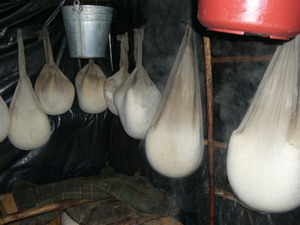
In the next room one shepherd was mincing the whey
while
another shepherd was stuffing the minced cheese into rounds. The third
room was
the storage room. In the center was a large scale to weigh the cheeses.
On the
floor and on the table were many rounds of cheese.
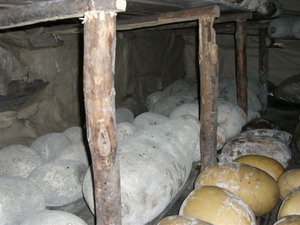
The shepherds sell the cheese and divide the money
between
themselves and the farmers down in the valley.
One shepherd gave us two kinds of cheese to taste – kash, which
we
didn’t like and borduf which was absolutely delicious. I bought some so
we
could eat it with our sandwiches for lunch. We took many pictures and
then said
goodbye and left. We walked until we
came to a mountain cabane where we ate
our lunch.
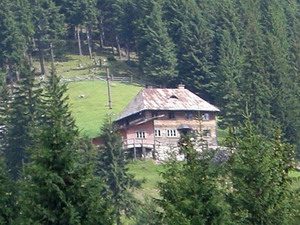
After lunch we filled our water bottles from a
spring that
was flowing out of the mountainside and then started to walk down the
mountain.
Although it took some 3 hours to walk down we
loved walking
through the forest. Atalya and I had our photo taken as we walked
through the
forest of ferns growing under the trees. Back
at the hotel we brushed the mud off our shoes.
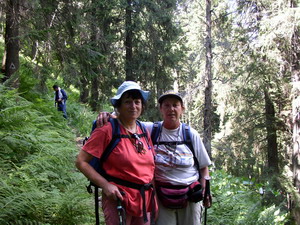
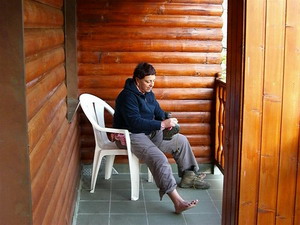
It was a wonderful day and a chance for all the
women to
have their photo taken together.
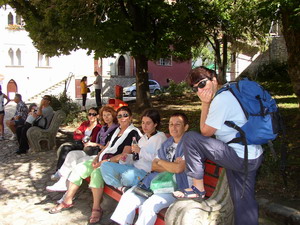
The next day we walked through the ancient town of
Sighisoara.
In the tower
is an ancient clock which was given to the town by the Jews who lived
in Sighisoara
some 400 years ago.
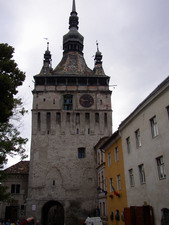
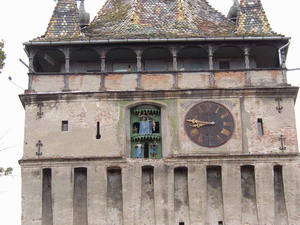
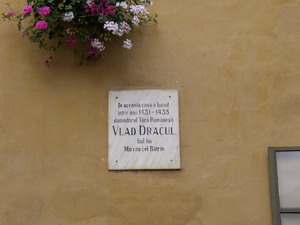
We stopped to look at the house where Vlad Dracula was born.
I'm sure
you have all heard about vampires. Just over 100 years ago Bram Stoker
wrote a very
popular story about Dracula, a count from Transylvania
(Romania)
who drank people’s blood. All vampire horror stories today are based on
this
old book. Dracula was inspired by Vlad Dracul, who lived
in the Carpathian Mountains in Romania.
He was an extremely cruel man and killed tens of thousands of people
during his
rule between 1456-1462. But in Romania
he is a folk hero because he was the only man able to stop foreign
Turks from invading Romania.
.
Our last climb before we flew home was up 1096
steps to the
top of one of the high fortresses that Dracul built over 500 years ago.
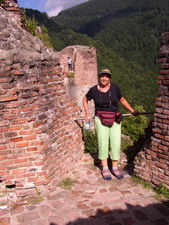
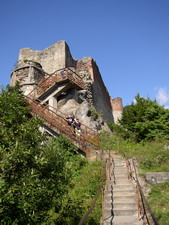
Go
to Granny Climbs a Mountain




It was very quiet as we walked in the forest.
Sometimes the
trees were so thick it was dark even during the day. We knew that
wolves sleep
during the day so that there was nothing to be afraid of. We also knew
that
perhaps there was a bear who could smell us in
the forest but because we were all walking
together he would not attack us.










